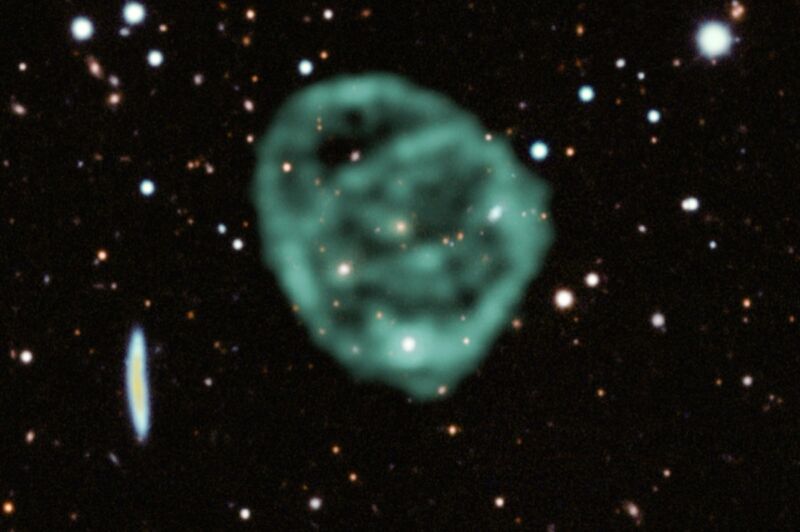We have our best look yet at mysterious ORCs (odd radio circles) in space

Enlarge / Data from SARAO's MeerKAT radio telescope data (green) showing the odd radio circles, is overlaid on optical and near infrared data from the Dark Energy Survey. (credit: J. English (U. Manitoba)/EMU/MeerKAT/DES(CTIO))
Astronomers have been puzzling over the nature and origin of rare, mysterious radio circles in space ever since the objects were first discovered in 2019. Now, the high-resolution MeerKAT radio telescope in South Africa has captured one such circle in much greater detail, offering some helpful clues about this rare phenomenon. The image and accompanying analysis appeared in a preprint on Arxiv, and the paper has been accepted for publication in the Monthly Notices of the Royal Astronomical Society.
The discovery arose from the Evolutionary Map of the Universe (EMU) project, which aims to take a census of radio sources in the sky. Several years ago, Ray Norris, an astronomer at Western Sydney University and CSIRO in Australia, predicted the EMU project would make unexpected discoveries. He dubbed them "WTFs." Norris admitted in a 2020 piece for The Conversation that he expected those discoveries would arise from machine learning analysis, given the vast amounts of data involved. "But these discoveries were made with good old-fashioned eyeballing," he wrote.
One pair of eyeballs belonged to Anna Kapinska, an astronomer at the National Radio Astronomy Observatory (NRAO). While browsing through new radio astronomy data collected by CSIRO's Australian Square Kilometer Array Pathfinder (ASKAP) telescope, Kapinska noticed several strange shapes that didn't seem to resemble any known type of object. Following Norris' nomenclature, she labeled them as possible WTFs. One of those, per Norris, "was a picture of a ghostly circle of radio emission, hanging out in space like a cosmic smoke ring."
Read 10 remaining paragraphs | Comments